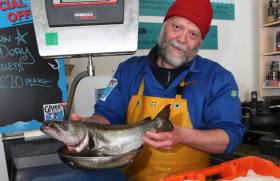Displaying items by tag: Croaker
One Galway fishmonger stocking up ahead of the perennially busy Good Friday trade got more than he bargained for with his catch of the week.
Stefan Griesbach from Gannet Fishmongers and Eatmorefish.ie came across a fish a lot more unusual than the average cod and whiting in the 2kg meagre (Argyrosomus regius) — also known as the croaker fish — a relative of the stone bass which is a farmed fish popular on many Irish restaurant menus.
Common in the waters in south-west of France or west of Africa, the meagre, despite its name, is not so small by nature.
Indeed, the 2kg specimen Stefan spotted in Rossaveal on Monday (14 April) is just a fraction of its cousins that can reach up to two metres in length and weigh more than 200kg.
Meagre is a renowned game fish but also prized for its meaty fillets, which was the big attraction for Stefan when he found it in a mixed box of fish, having been caught by the MFV Killoran south of the Aran Islands on its first trip.
However, before taking the knife to this unique Easter treat, Stefan got in touch with Dr Declan Quigley of the Sea Fisheries Protection Authority to find out just how rare his purchase really was.
And he was surprised to learn that records show only two other meagre/croaker catches in Irish waters, at Passage West, Co Cork in 1840 and Annagassan, Co Louth in 1896 — both in the Victorian era of the 19th century.
Now the special catch is up for auction in aid of the RNLI. Bidding starts at €75 for the auction which closes midday on Thursday 18 April so be sure to act fast.
























































